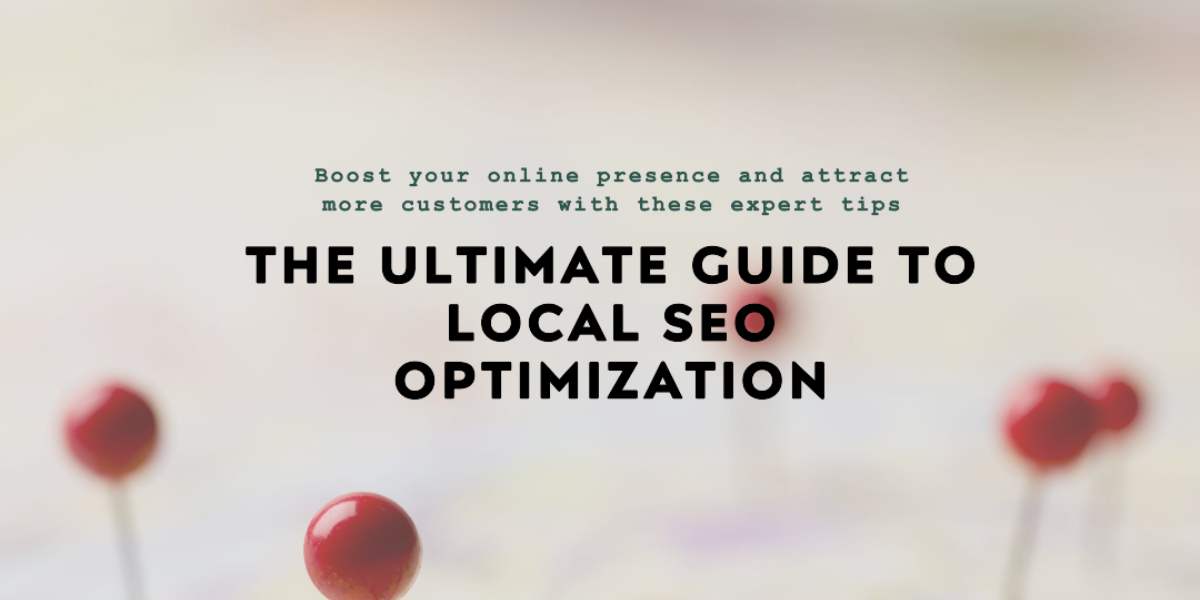Introduction to Local SEO Optimization
In today’s digital era, local businesses in Michigan face fierce competition to attract and retain customers. With the increasing dependence on search engines to find products and services, mastering Local SEO optimization has become essential for businesses to succeed in the local market. In this article, we will explore the concept of Local SEO, its importance for Michigan businesses, and the key benefits of optimizing locally.
What is Local SEO?
Local SEO, or Local Search Engine Optimization, refers to the process of improving a business’s online visibility in local search results. It involves various strategies and techniques aimed at enhancing a business’s presence on search engines, map services, and other online platforms. The goal of Local SEO is to make it easier for potential customers in Michigan to find and engage with local businesses.
Importance of Local SEO for Michigan Businesses
For Michigan businesses, Local SEO is a game-changer. As customers increasingly rely on search engines to find local products and services, being visible in local search results becomes crucial. Local SEO optimization ensures that businesses show up when potential customers search for products or services in their area, increasing the chances of attracting new customers and driving foot traffic to physical locations.
Key Benefits of Optimizing Locally
Local SEO offers several benefits to Michigan businesses
- Increased Local Visibility: Optimizing for Local SEO helps businesses appear in the Local Pack, a section of Google’s search results that showcases local businesses relevant to the search query. Being listed in the Local Pack significantly boosts a business’s visibility to local customers.
- Targeted Traffic: Local SEO targets specific keywords and phrases related to the business’s products and services in Michigan. This results in attracting highly targeted and relevant traffic, increasing the likelihood of conversions.
- Enhanced User Experience: Local SEO emphasizes providing valuable information to potential customers, such as business hours, contact details, and directions. This improves the overall user experience and encourages potential customers to visit the business’s physical location.
- Competitive Edge: Implementing Local SEO strategies allows businesses to compete effectively against local competitors. By staying ahead in local search rankings, businesses can gain a competitive edge and capture a larger share of the local market.
- Cost-Effectiveness: Compared to traditional advertising methods, Local SEO is a cost-effective approach to reach local customers. It allows businesses to market to their target audience without incurring substantial advertising costs.
Understanding Michigan’s Local Search Landscape
Before diving into Local SEO strategies, businesses must first understand the local search landscape in Michigan. Analyzing local search trends helps identify the keywords and phrases potential customers use to find products and services. By understanding local search behavior, businesses can tailor their content and marketing efforts to align with the preferences of Michigan’s local audience.
Analyzing Local Search Trends in Michigan
In Michigan, local search trends may vary across different cities and regions. Conducting thorough keyword research can provide valuable insights into the most searched terms related to a business’s industry in specific locations. Businesses can use tools like Google’s Keyword Planner to identify high-demand local keywords and develop targeted content accordingly.
Identifying Target Local Keywords
Identifying target local keywords is a crucial step in Local SEO optimization. Businesses must focus on keywords that potential customers in Michigan are likely to use when searching for their products or services. For example, a bakery in Detroit may target keywords like “best cupcakes in Detroit” or “local bakeries near me.”
Competitive Analysis for Local SEO in Michigan
Analyzing the competition is vital for Local SEO success. By evaluating the SEO strategies of local competitors, businesses can identify opportunities to differentiate themselves and gain a competitive advantage. This analysis includes examining competitors’ website content, local citations, backlinks, and social media presence.
Creating a Google My Business (GMB) Strategy
Google My Business (GMB) is a powerful tool for local businesses in Michigan. It allows businesses to manage their online presence on Google, appearing in local search results and Google Maps. Optimizing GMB is a crucial aspect of Local SEO optimization.
Setting up a Google My Business Profile
To get started with GMB, businesses must create and verify their Google My Business profile. This involves providing accurate and up-to-date business information, such as business name, address, phone number (NAP), website URL, and business category.
Optimizing GMB for Local Visibility
To maximize local visibility, businesses should optimize their GMB profiles with relevant keywords, including the primary keyword “Local SEO optimization Michigan.” Crafting a compelling business description, selecting appropriate categories, and uploading high-quality images are essential for attracting potential customers.
Leveraging GMB Posts and Updates
GMB allows businesses to post updates, offers, events, and other engaging content directly on their profiles. Regularly posting relevant content not only keeps the business’s GMB listing fresh but also improves its chances of appearing in local search results.
NAP Consistency and Local Citations
NAP consistency is a critical factor in Local SEO. Search engines use NAP information to verify the legitimacy of a business. Ensuring consistent NAP information across all online platforms is essential for search engines to recognize and trust the business’s data.
Importance of NAP Consistency
Inaccurate or inconsistent NAP information can confuse search engines and potential customers, resulting in lower local search rankings. Businesses should double-check and update their NAP information on their website, GMB, social media profiles, and online directories.
Managing Local Citations Effectively
Local citations are online mentions of a business’s name, address, and phone number on various websites and directories. Managing local citations effectively involves monitoring existing citations, correcting inaccurate information, and building new citations on relevant and authoritative platforms.
Top location Citation Source for Michigan Businesses
Building local citations on reputable and locally relevant platforms is essential for Local SEO optimization. Some top location citation sources for Michigan businesses include local directories, industry-specific directories, and chamber of commerce websites.
Localizing On-Page SEO
On-page SEO optimization ensures that a business’s website is search engine-friendly and relevant to the local audience. Localizing best practices for local on-page SEO involves implementing strategies to target local keywords and signal to search engines the business’s location relevance.
Crafting Location-Specific Meta Tags and Titles
Optimizing meta tags and titles with location-specific keywords is a fundamental on-page SEO technique. Businesses should include the primary keyword “Local SEO optimization Michigan” in meta tags, titles, and headings.
Optimizing Website Content for Local Keywords
Incorporating local keywords naturally throughout the website’s content is essential for Local SEO. Businesses should create location-specific landing pages and tailor their content to cater to the preferences and needs of the Michigan audience.
Structured Data Markup for Local Businesses
Using structured data markup, such as Schema.org markup, helps search engines understand the context and relevance of a business’s content. Implementing structured data for local businesses can enhance search engine visibility and improve the chances of appearing in rich snippets.
Enhancing User Experience for Local Visitors
User experience plays a vital role in Local SEO optimization. Ensuring a seamless experience for local visitors improves engagement and encourages them to explore the business further.
Mobile-Friendly Website Design
With a significant portion of local searches coming from mobile devices, having a mobile-friendly website design for local SEO is critical for Local SEO success. Mobile responsiveness not only enhances the user experience but also earns favor from search engines, which prioritize mobile-friendly websites in mobile search results.
Localizing Website Content and CTAs
Customizing website content and Calls to Action (CTAs) to suit the preferences of Michigan’s local audience can increase engagement and conversion rates. Tailored CTAs that prompt visitors to take local-specific actions, such as “Visit our store in Detroit” or “Call us for SEO services in Michigan,” can have a significant impact.
Integrating Google Maps and Directions
Integrating Google Maps on the website allows visitors to easily locate the business’s physical address and get directions. This simplifies the process for potential customers and increases the likelihood of visits to the business’s location.
Local Link Building Strategies
Backlinks from reputable local sources can significantly boost a business’s Local SEO performance. Building local backlinks involves acquiring links from other Michigan businesses, organizations, and influential individuals.
Building Relationships with Local Influencers
Collaborating with local influencers or industry leaders in Michigan can lead to valuable backlinks and increased brand exposure. Partnerships with influencers can also help businesses tap into new audiences and gain credibility in the local market.
Joining Michigan Business Directories and Associations
Listing the business in local business directories and industry-specific associations can improve the business’s online visibility and reputation. These directories often provide opportunities for businesses to showcase their services, products, and customer reviews.
Earning Local Backlinks from Partners
Establishing mutually beneficial relationships with local partners, such as suppliers or complementary businesses, can lead to opportunities for gaining backlinks from their websites. These local backlinks signal to search engines that the business is relevant and trustworthy in the local context.
Customer Reviews and Reputation Management
Customer reviews and online reputation significantly influence consumers’ purchasing decisions. Managing customer reviews and addressing feedback effectively are critical aspects of Local SEO optimization.
Encouraging Positive Reviews from Local Customers
Actively encouraging satisfied customers to leave positive reviews on Google and other review platforms can help build the business’s online reputation. Positive reviews act as social proof and can influence potential customers to choose the business over competitors.
Addressing Negative Reviews Professionally
Negative reviews are inevitable, but how businesses handle them can make a difference. Addressing negative feedback professionally and proactively seeking to resolve issues demonstrates a commitment to customer satisfaction.
Monitoring and Managing Online Reputation
Regularly monitoring online reviews and mentions of the business allows businesses to promptly respond to feedback and address any concerns. Reputation management tools can help businesses keep track of their online reputation and take appropriate actions.
Local Content Marketing
Content marketing is a powerful strategy to engage the local audience and establish the business as an authority in the industry. Local content marketing involves creating location-based content that resonates with Michigan’s local community.
Creating Location-Based Content
Crafting blog posts, articles, and other content that highlights local events, news, and topics of interest to Michigan residents can generate interest and engagement. Content that showcases the business’s involvement in the local community can also foster a positive brand image.
Promoting Local Events and Activities
Promoting local events and activities, whether hosted by the business or other organizations, can attract local audiences and drive traffic to the website and physical location. Businesses can use content to provide event details, share event highlights, and encourage participation.
Engaging with the Local Community
Actively engaging with the local community through content can foster a sense of connection and loyalty. Businesses can feature customer stories, community partnerships, and testimonials to showcase their commitment to serving Michigan residents.
Leveraging Social Media for Local Reach
Social media platforms provide opportunities for businesses to connect with the local audience, share content, and foster engagement. A well-crafted social media strategy tailored to Michigan residents can enhance the business’s local reach.
Developing a Local Social Media Strategy
A local social media strategy involves identifying the most relevant social media platforms for the business and creating a content plan that aligns with the interests and needs of Michigan residents.
Using Location Tags and Check-ins
Encouraging customers to use location tags and check-ins when visiting the business’s physical location can increase the business’s visibility on social media. This generates organic reach and promotes word-of-mouth marketing.
Running Localized Social Media Campaigns
Localized social media campaigns, such as promotions for Michigan residents or exclusive local events, can generate excitement and attract more followers and customers.
Local SEO for Mobile and Voice Searches
With the rise of mobile and voice search usage, optimizing for mobile devices and voice queries has become essential for Local SEO in Michigan.
Optimizing for Mobile Devices
Mobile optimization includes ensuring the website is mobile-friendly, loads quickly on mobile devices, and offers a seamless browsing experience. This optimization enhances the chances of appearing in mobile search results and engaging with mobile users.
Targeting Voice Search Queries in Michigan
Voice search optimization involves tailoring content to address voice queries that Michigan residents may use when searching for products or services. Voice-friendly content and FAQ-style formats can increase the chances of appearing in voice search results.
Voice Search SEO Best Practices
Businesses should use natural language and long-tail keywords that align with voice search queries. Providing concise answers to commonly asked questions can also improve voice search visibility.
Local SEO Analytics and Tracking
Measuring the performance of Local SEO efforts is crucial for understanding what works and what needs improvement. Key metrics and Google Analytics provide valuable insights into the effectiveness of Local SEO strategies.
Key Metrics to Measure Local SEO Performance
Some key metrics to track include local search rankings, organic traffic, click-through rates (CTRs) for local search results, and the number of calls and direction requests from Google My Business.
Utilizing Google Analytics for Local Insights
Google Analytics provides in-depth data on website traffic, including the location of visitors. Analyzing this data allows businesses to identify the sources of local traffic and tailor their marketing efforts accordingly.
Monitoring Local SEO Progress and Adjusting Strategies
Continuously monitoring Local SEO performance helps businesses identify areas for improvement and make data-driven decisions. Adjusting strategies based on performance insights can lead to better outcomes and increased local visibility.
Staying Compliant with Google’s Local SEO Guidelines
Following Google’s guidelines for Local SEO is crucial to avoid penalties and maintain a positive online presence.
Understanding Google’s Local SEO Policies
Google’s guidelines provide specific recommendations for creating and optimizing Google My Business profiles and local business websites. Adhering to these guidelines ensures compliance with Google’s requirements.
Avoiding Common Local SEO Mistakes
Businesses should be aware of common Local SEO mistakes, such as keyword stuffing, using incorrect NAP information, and engaging in unethical practices. Avoiding these mistakes helps maintain a strong online reputation and search rankings.
Maintaining Ethical Local SEO Practices
Ethical Local SEO practices involve providing accurate information, engaging in organic link building, and creating valuable content for the local audience. Ethical practices build trust and credibility with both customers and search engines.
Expanding Local SEO to Nearby Areas
As businesses grow, expanding Local SEO efforts to nearby cities and regions can open new opportunities for growth and increased customer reach.
Targeting Surrounding Cities and Regions
Expanding local SEO targeting to nearby areas involves creating location-specific landing pages and content that caters to the preferences of customers in those regions.
Adapting Strategies for Different Locations
Different locations may have unique characteristics and customer preferences. Adapting Local SEO strategies to suit the needs of diverse locations can help businesses connect with a wider audience.
Scaling Local SEO for Regional Growth
As businesses expand their reach to multiple locations, scaling Local SEO efforts becomes essential. Using automation tools, maintaining consistent NAP information, and tracking local performance can facilitate scaling.
Incorporating Local SEO in Content Outreach
Content outreach is an effective way to build relationships, gain exposure, and acquire backlinks. Incorporating Local SEO in content outreach allows businesses to target local audiences and improve local search rankings.
Guest Posting on Local Michigan Blogs
Collaborating with local Michigan blogs for guest posting opportunities allows businesses to reach new audiences and earn backlinks from local sources.
Collaborating with Local Influencers
Engaging with local influencers can lead to collaborations, guest posts, and social media exposure, all of which contribute to Local SEO and brand visibility.
Localizing Email Marketing Campaigns
Personalizing email marketing campaigns with location-specific offers and content can increase engagement and drive traffic to the business’s website and physical location.
Local SEO for E-commerce Businesses
E-commerce businesses in Michigan can benefit from Local SEO optimization to target local customers and improve online visibility.
Optimizing Product Pages for Local Searches
Optimizing product pages with local keywords helps e-commerce businesses appear in local search results when Michigan residents search for specific products.
Localizing E-commerce Content and CTAs
Customizing e-commerce content, product descriptions, and Calls to Action to suit Michigan residents can increase conversions and customer engagement.
Geo-targeted Advertising for Michigan Customers
Using geo-targeted advertising allows e-commerce businesses to display ads to specific audiences in Michigan, increasing the relevance of their ads and improving conversion rates.
Integrating Local SEO with Other Marketing Channels
Integrating Local SEO with other marketing channels creates a cohesive marketing strategy and enhances the overall effectiveness of marketing efforts.
Combining Local SEO with PPC Advertising
Integrating Local SEO with Pay-Per-Click (PPC) advertising allows businesses to target local keywords and appear in both organic and paid search results.
Local SEO’s Role in Overall Marketing Strategy
Local SEO plays a vital role in driving online and offline conversions. Integrating Local SEO into the overall marketing strategy helps businesses achieve their marketing goals.
Cross-promoting Local Campaigns
Cross-promoting local campaigns across different marketing channels can amplify the message and increase brand visibility among Michigan residents.
Summary: Mastering Local SEO in Michigan
Mastering Local SEO optimization in Michigan is essential for businesses aiming to thrive in the competitive local market. By implementing effective Local SEO strategies, businesses can increase local visibility, attract targeted traffic, and improve their online reputation.
Key Takeaways and Actionable Insights
- Local SEO optimization is crucial for Michigan businesses to attract local customers and gain a competitive edge.
- Analyzing local search trends helps identify target keywords and align content with the preferences of Michigan residents.
- Google My Business (GMB) is a powerful tool for local businesses, and optimizing the GMB profile improves local visibility.
- NAP consistency and local citations are essential for search engines to trust and recognize a business’s data.
- Localizing best practices for local on-page SEO involves incorporating local keywords and signaling relevance to the local audience.
- Enhancing user experience through mobile-friendly website design for SEO and Google Maps integration improves customer engagement.
- Building local backlinks and managing online reputation contribute to a strong local presence.
- Local content marketing and social media strategies help businesses engage with the local community.
- Optimizing for mobile and voice searches is vital due to the increasing use of mobile devices and voice assistants.
- Monitoring Local SEO performance and adjusting strategies based on data are critical for continuous improvement.
FAQs
1. Is there a difference between organic SEO and local SEO?
Yes, there is a difference between organic SEO and local SEO. Organic SEO focuses on improving a website’s visibility in general search results, regardless of the searcher’s location. Local SEO, on the other hand, targets local search queries and aims to improve a business’s visibility in local search results, especially in the “Local Pack” section.
2. How long does it take to see results from local SEO efforts?
The time it takes to see results from local SEO efforts can vary depending on several factors, such as the competitiveness of the industry, the location, and the effectiveness of the strategies implemented. Generally, businesses may start to see improvements in local search rankings and website traffic within a few weeks to a few months.
3. Can I optimize for multiple locations in Michigan?
Yes, businesses can optimize for multiple locations in Michigan by creating location-specific content, landing pages, and Google My Business profiles for each target area. This approach allows businesses to target a broader audience and cater to the preferences of customers in different regions.
Conclusion
Your Path to Local SEO Success in Michigan
Mastering Local SEO optimization in Michigan is essential for businesses aiming to thrive in the competitive local market. By implementing effective Local SEO techniques, businesses can increase local visibility, attract targeted traffic, and improve their online reputation. Understanding the local search landscape, optimizing Google My Business, managing local citations, and leveraging social media are just some of the key steps businesses can take to succeed in Local SEO. By staying compliant with Google’s guidelines and continuously monitoring performance, businesses can fine-tune their strategies and pave their path to Local SEO success in Michigan. With a strong focus on delivering value to the local community, businesses can establish themselves as trusted and authoritative sources, creating a lasting impact on Michigan’s local market.








